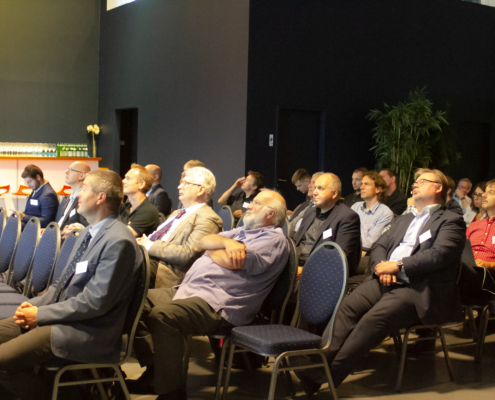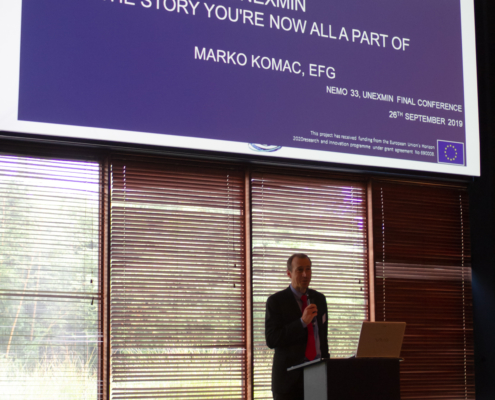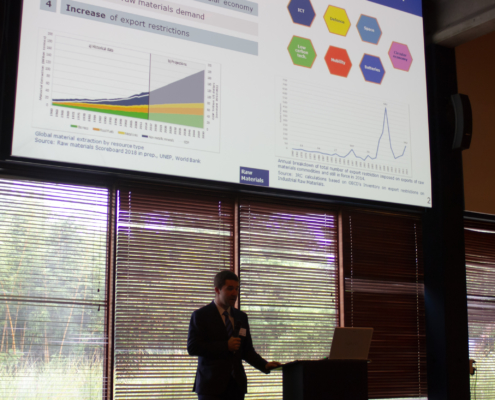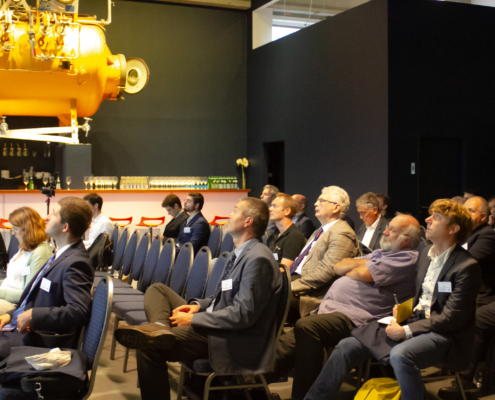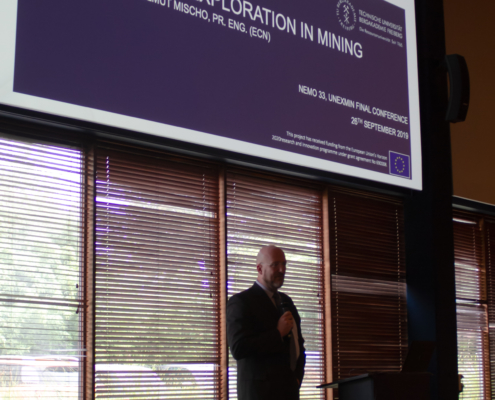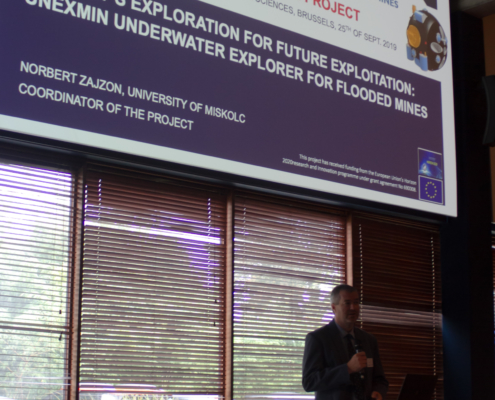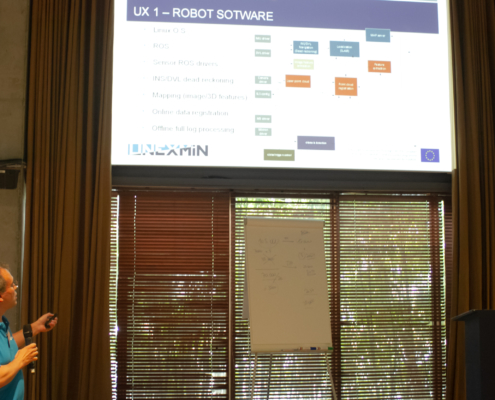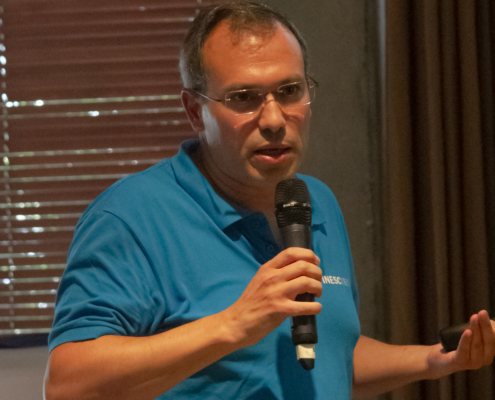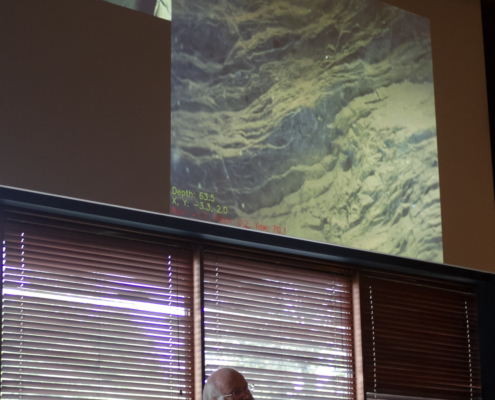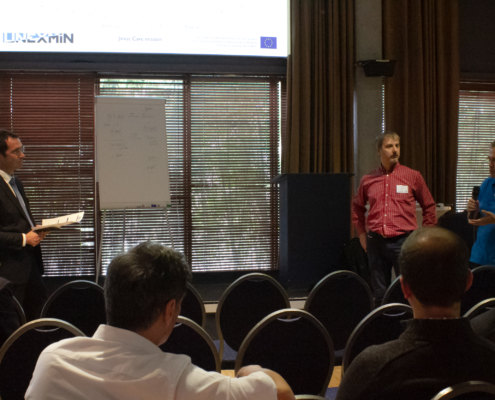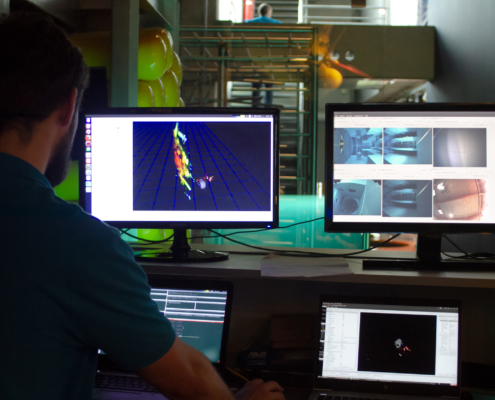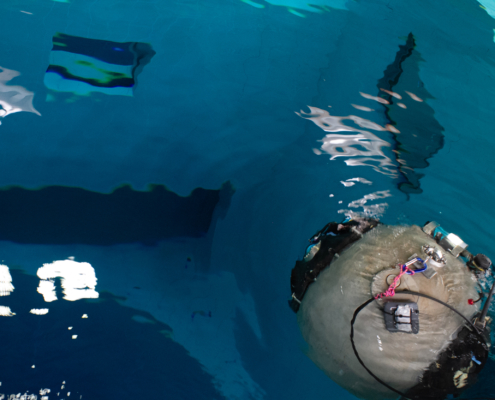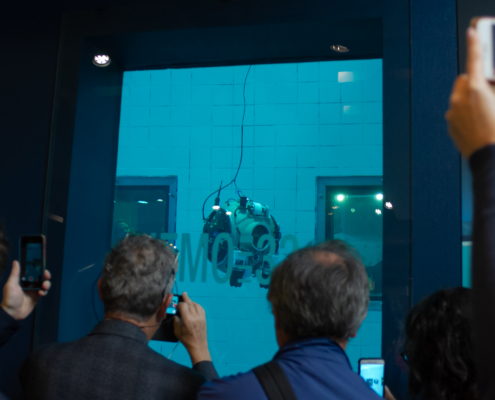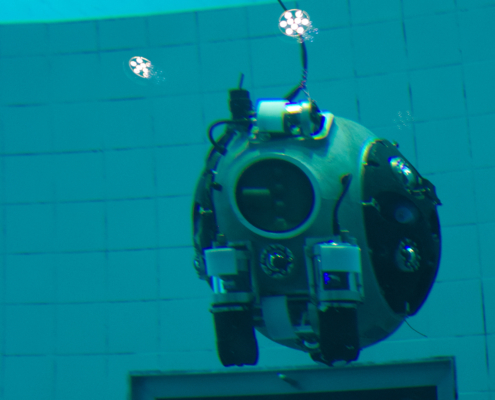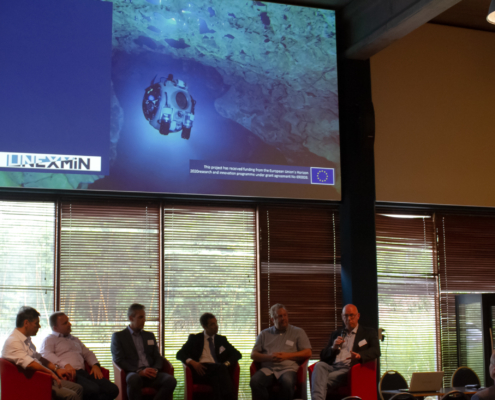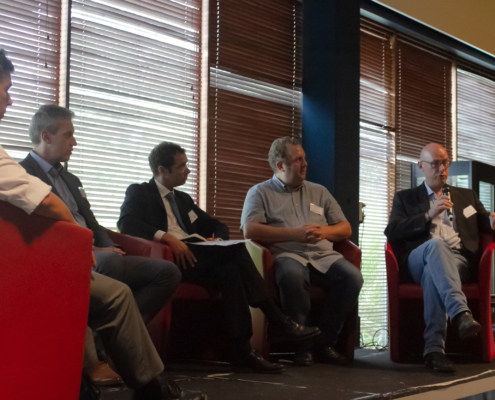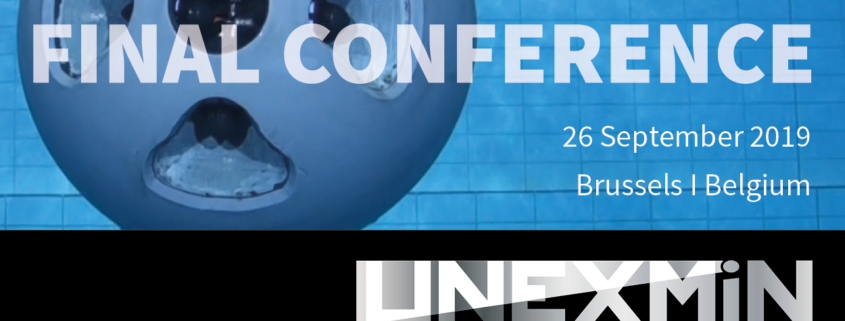
About
Programme
Speakers’ bios
Privacy policy
Photos
Presentations
Videos
About
About the event
The Horizon 2020-funded UNEXMIN project held its final conference in Brussels on 26th September 2019. Project outcomes were presented and discussed and a UX-1 robot was demonstrated in a pool.
The programme included high-level discussions on raw materials policies, on how the UNEXMIN project supports both the policies and European industrial innovation, and on the capabilities and future application of the exploration system.
A total of 80 participants, including project members, EU policymakers, academics, mineral exploration and exploitation companies, cave exploration companies, SMEs focussing on geological consultancy and minerals surveying, and robotics and ICT experts from private and public institutions made the UNEXMIN Final Conference a success!

This project has received funding from the European Union’s Horizon H2020 research and innovation programme under grant agreement No 690008.
Programme
Morning session: setting the political context: the future of mining in Europe
9:00 – Registration
9:30 – Welcome speech – Marko Komac (European Federation of Geologists)
9:45 – European policy context – Daniel Cios (European Commission, Policy Officer, DG GROW)
10:05 – Aim of the call for proposals – Marcin Sadowski (EASME, Head of sector – Raw Materials)
10:25 – Coffee break
10:45 – Future of exploration in mining – Helmut Mischo (TU Bergakademie Freiberg)
11:05 – UNEXMIN – aim and outcomes – Norbert Zajzon (UNEXMIN, project coordinator, University of Miskolc)
11:30 – ROBOMINERS H2020 project – Claudio Rossi (ROBOMINERS, project coordinator, Universidad Politécnica de Madrid)
11:45 – Questions and answers
12:00 – Lunch break
Afternoon session I: Raw materials & mining
13:00 – UNEXMIN processing and data analysis – Stephen Henley & Hilco van Moerkerk (RCI/4dcoders)
13:20 – UNEXMIN field trials and geological interpretation – Gorazd Zibret (Geological Survey of Slovenia) & Richard Shaw (Ecton Mine Educational Trust)
13:50 – UNEXMIN Inventory of flooded mines – Isabel Fernandez (European Federation of Geologists)
14:10 – Discussion session I
Afternoon session II: Robotics & functionalities
13:00 – UX-1 robotic functions: testing and validation – Jussi Aaltonen (University of Tampere)
13:20 – UX-1 multi robot platform – José Miguel Almeida (Instituto de Engenharia de Sistemas e Computadores, Tecnologia e Ciência)
13:50 – UX-1 autonomy, mine exploration and mapping – Claudio Rossi (Universidad Politécnica de Madrid)
14:10 – Discussion session II
14:30 – UX-1 robot showcase + coffee break
Afternoon round table and closing session
15:30 – Round table introduction – Mineral exploration, future and long-term initiatives
Round table discussion with panelists
- Massimo Gasparon (EIT Raw Materials)
- Mike Buxton (TU Delft)
- Uwe Restner (Sandvik)
- Kiril Horoshenkov (Sheffield Robotics)
- Yves Vanbrabant (RBINS)
17:00 – Closing remarks – Vitor Correia (European Federation of Geologists)
Speakers’ bios
Morning session: setting the political context: the future of mining in Europe
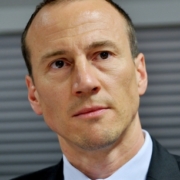
Assoc. Prof. Marko Komac, Ph.D., EurGeol #1294, currently an independent consultant, an external researcher at the Faculty for civil engineering at the University of Ljubljana, an Associate Professor for GIS at University of Nova Gorica, the President of the European Federation of Geologists (EFG) and a Member of the International Raw Materials Observatory Board, serving as the Treasurer. Between 2006 and 2014 Marko was the director of the Geological Survey of Slovenia where he also worked as a part-time researcher. From November 2016 to May 2019 Marko was the member of the Board of EFG, where he served as the External Relations Officer. From 2012 to 2016 he was a Vice-President of the IUGS, and in years 2011 and 2012 he was the President of the EuroGeoSurveys. He has more than 21 year experiences in the field of landslide analyses, geographical information systems (GIS), application of remote sensing in geology, spatial analyses and modelling, geostatistics, mass-movements analyses, and management and international networking. Currently he’s involved in several EU-funded geological projects. He’s an author or co-author of over 500 bibliographic units mainly from the above listed research areas.
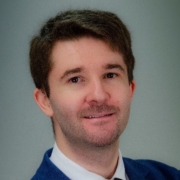
Daniel Cios Joined the Commission in 2018 in the Directorate-General for Internal Market, Industry, Entrepreneurship and SMEs. Has been following closely EU raw materials policies since 2008 and conducted academic research and gained professional experience in this field. Before joining the Commission he worked as a consultant for mining and oil companies on issues related to supplies of raw materials and performed economic and technological analysis of various innovative projects. He also worked in the Polish Ministry for Foreign Affairs for the Polish Presidency of the Council of the European Union.
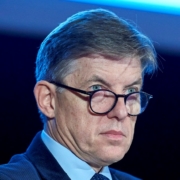
Marcin Sadowski obtained a PhD in physics from the University of Warsaw in 1994 and later worked on investigating the optical properties of semiconducting structures and materials at the University of Warsaw, the University of Montpellier, and the High Magnetic Field Laboratory in Grenoble. In 2007 he moved to the European Commission in Brussels. For several years, he was a Research Programme Officer at the Directorate General for Research of the European Commission, responsible for research on advanced materials. Since 2014, he is the Head of the Raw Materials sector at the Executive Agency for Small and Medium-Sized Enterprises (EASME) of the European Commission, responsible for the research and innovation projects of Horizon 2020 concerned with Raw Materials.
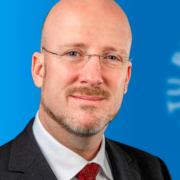
Helmut Mischo is a Mining Engineer, from Aachen University, in Germany. He has worked as project manager, engineering consultant and professor in some Universities as the Namibia University of Science and Tech. and Technical University of Freiberg. He is also member of Supervisory Board of Wismut GmbH.
He has published more than 180 Scientific Publications, Technical and Conference Papers worldwide. He has participated in several research projects like Fibre ropes in underground mining, Mine rescue and Small scale mining projects.
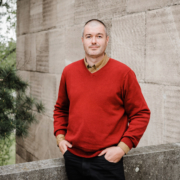
Norbert Zajzon competed his studies about mineralogy, geochemistry and solid mineral resources at the Eötvös Loránd University (MSc 2001, PhD 2006), Budapest, Hungary. His research subject was instrumental mineralogy and geochemistry related to global environmental crises. Until now he is dedicated to numerous analytical techniques in the geoscience field.
He is currently an associate professor at the Institute of Mineralogy and Geology, and head of the Mineralogy – Petrology Department, University of Miskolc (Miskolc, Hungary), teaching instrumental mineralogy, ore deposits and astronomy and planetology and head of the microprobe laboratory (http://www.geology.uni-miskolc.hu/index.php/en/staff/13-munkatarsak/438-dr-norbert-zajzon). He is also the coordinator of the currently running UNEXMIN project (www.unexmin.eu) which is a European Union funded Horizon 2020 project, aims to develop an autonomous underwater robotic explorer (UX-1) to 500 m water depth, capable to 3D map and deliver geo-scientific information by non-invasive methods from abandoned, flooded underground mines.
Afternoon session I: Raw materials & mining
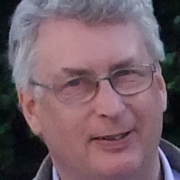
Stephen Henley is a geologist, gaining a PhD at Nottingham University in 1970. His early career was at the Bureau of Mineral Resources (Australia) and the British Geological Survey. In 1981 he founded Datamine (geological modelling/mine-planning software). Since 1993 he has provided computer-based geological services, including predictive exploration research with CSIRO, and independent advice to the board of Petropavlovsk plc. A former chairman of PERC, he is a participant in a number of European R&D projects and is president of the International Raw Materials Observatory.
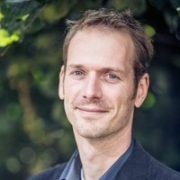
Hilco van Moerkerk is an engineer with a MSc. in Electrical Engineering from Twente University in Enschede, The Netherlands. In his early carrier he focused on medical research and image processing. During his time in New Zealand he started working for a geological software company after discovering the similarities between the mining industry and the medical sciences. After returning to Europe he started his own company GEOREKA Software combining his engineering skills with his medical and geological sciences experience to provide affordable 3D geological modelling software. He remains active in research through an informal consortium called 4DCoders focusing on visualization and interpretation.
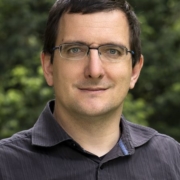
Gorazd Žibret, Ph.D., male, geologist, has more than 15 years of experience in assessing impacts of mining and ore processing to the environment. His work is also related to minerals policy and in developing new approaches to geological data mining by using artificial intelligence. He has participated in 14 international projects from various topics, including mineral resources, geological hazards, earth observation, water management etc. He is coordinating the “Mineral Resources” research group (currently containing 10 researchers with Ph.D. and 7 supporting staff), funded by Slovenian Research Agency, and currently mentoring 2 PhD students. Gorazd’s bibliography includes 24 original scientific articles in the field of environmental impacts of mining and ore processing activities to the environment and society and in the field of data mining in geosciences, some of them published in the world’s highest ranking scientific journals, 5 chapters in scientific books and more than 100 other bibliographic units.
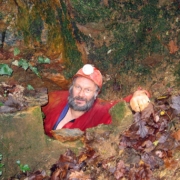
Richard Shaw is an exploration and mining geologist (C. Geol) with over 25 years of experience in the deep geological disposal of radioactive waste and 7 years of experience of exploration, environmental impact assessment and mining feasibility for the Kayelekera uranium deposit in Northern Malawi, Africa. He retired from the British Geological Survey about 3 years ago. He is a member of the UK Governments Committee on Radioactive Waste Disposal. He undertook a PhD on caves and mines in the Peak District and, as an active caver and miner explorer, have been studying the underground world of the Peak District since the mid 1970’s, including the mines of the Ecton Area. He is a director (editor) of the Peak District Mines Historical Society and mine manager of their Temple Mine in Matlock Bath.
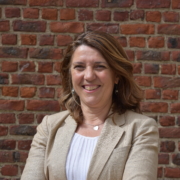
Dr Isabel M Fernández Fuentes is Executive Director of the European Federation of Geologists since 2008. She is an engineering geologist, with over 25 years of professional experience, graduated from the Granada University, 1987, Master Engineering Geology, 1990, and PhD in Geology, 1997, from the University Complutense in Madrid, Spain. Since 1987 she worked as a researcher in applied Geophysics in the Centre for Studies and Experimentation of the Ministry of Public Works, Madrid, Spain. From 2001 onwards, she works for the European Federation of Geologists, EFG, covering expertise and professional input including geothermal energy, hydrogeology, mineral raw material, and environmental protection field. In 2008 she was appointed as Executive Director of EFG. Working with EFG, Isabel has coordinated and participated in different European projects, and supports the coordination of EFG’s Expert Groups, among others activities.
Afternoon session II: Robotics & functionalities
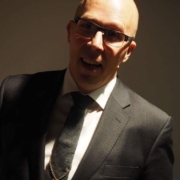
Dr Jussi Aaltonen is a research manager at Mechatronic Research Group of Tampere University. He has master of science in mechanical engineering and doctorate in aircraft engineering. His main research interests range from aircraft systems and autonomous systems to off-shore and deep sea systems. He has wide experience in research and development in both industry and academia. He has over 50 technical and scientific publications.
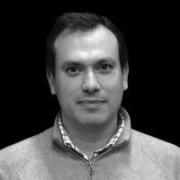
José Miguel Almeida is a professor at the School of Engineering (ISEP) of the Porto Polytechnic Institute (IPP) and research coordinator at the robotics and autonomous systems group of INESC TEC in Portugal. His main research area is sensing, perception and navigation in mobile multi-robot systems. He works in mobile robotics since 1993, and has participated in multiple robotic research projects with an extensive list of publications in both land, aerial, underwater and surface autonomous robots. He was a principal researcher in several research projects funded by entities such as Portuguese Science and Technology Foundation (FCT) and Portuguese Innovation Agency (Adi/ANI). He was the INESC TEC responsible for the Perception and Navigation task in the ¡VAMOS! project (H2020) and has an active role in the design, sensing and navigation of the UNEXMIN robots.
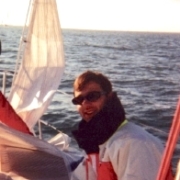
Prof. Claudio Rossi received his Ph.D. in Computer Science from the University of Bologna, Italy, in 2001 with a thesis on Nature-inspired search techniques for hard optimization problems. He has been visiting researcher at the LIACS (Leiden Institute of Advanced Computer Science, NL), post-doctoral fellow at the Department of Artificial Intelligence at the UPM and Visiting Professor at the University Carlos III of Madrid. During 2005-09 he was “Ramon y Cajal” research fellow at the UPM, and since 2009 he is professor at the UPM. His research interests in the last years have been directed towards applications of Computational Intelligence techniques (evolutionary algorithms, neural networks and fuzzy rules systems) to robotics. Since 2009, he has started working on bio-inspired systems, shifting form Nature-based (software) search techniques to Nature-based physical systems. He is the founder and lead researcher of the Bio-Inspired Systems Lab at UPM (www.disam.upm.es/crossi/Bio_Inspired_Systems_Lab/Bio_Home.html), focusing on mechatronic design, control and smart materials as well as Evolutionary Robotics. The BSLab takes inspiration from animal biomechanics to design innovative, light and simple mechatronic systems, with an eye on future service robots that will share living and working space with humans.
Prof. Rossi has participated in several international research projects, with ESA (European Space Agency), EC-funded (FP7, H202) and also with private companies. He is associated editor of Frontiers in Evolutionary Robotics and member of the editorial board of Frontiers in Bionics and Biomietics (Frontiers in Robotics and AI), and associated editor of the International Journal of Advanced Robotic Systems for the topic of bioinspired robotics.
Afternoon round table and closing session
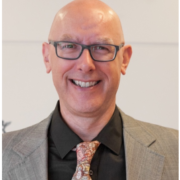
Dr Massimo Gasparon is the Innovation Director at EIT RwMaterials, the largest consortium in the raw materials sector worldwide, initiated and funded by the EIT (European Institute of Innovation and Technology), a body of the European Union. His responsibilities include the overall coordination and management of EIT RawMaterials’ funding program and International Outreach strategy. He holds a PhD in geochemistry from the University of Tasmania, and prior to joining EIT RawMaterials in 2017 he was a professor and geochemistry laboratory manager in the School of Earth Sciences at The University of Queensland. Between 1995 and 2013 he coordinated several programs aimed at establishing human impacts at research stations in the Australian Antarctic Territory, including the management of the Airllink program (direct flight connection between Australia and Antarctica). The main goal of his recent research has been to provide the geochemical tools for the assessment of risk to the environment and to human health, particularly at mine sites, following exposure to air, water and soil contaminated with metals and metalloids, particularly arsenic. He is the co-author of over 100 scientific publications, a Fellow of the Alexander von Humboldt Foundation, and a Special Visiting Researcher at the Federal University of Minas Gerais in Brazil. In 2006 he won a Carrick Citation for Outstanding Contribution to Student Learning, and received a UQ Award for Teaching Excellence in 2011. He was the Chair of the School’s Teaching and Learning Committee from 1997 to 2012, and coordinated the most awarded Earth sciences undergraduate curriculum across Australian universities.
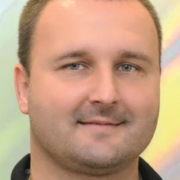
Uwe Restner is Product Manager for Roadheaders and Digitalization, working for SANDVIK Mining and Construction. Previously he worked as a geotechnical freelancer, assistant professor of geophysics at Mining University of Leoben and in Sandvik Mining and Construction where before the current position he carried out functions of engineering geologist, development manager and product and commercial manager. Uwe has a PhD in mining from the Mining University Leoben.
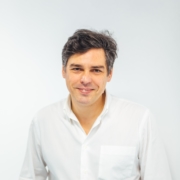
Kirill Horoshenkov is Professor of Acoustics at the University of Sheffield. His main research interests are in novel sensors for water industry, acoustic materials and physical acoustics. He leads the EPSRC Programme Grant Pervasive Sensing for Buried Pipes (www.pipebots.ac.uk), EPSRC UK Acoustics Network (www.acoustics.ac.uk) and Theme 3 (Inspecting and restoring water infrastructures using robotic autonomous systems) on the EPSRC TWENTY65 Grand Challenges Grant (www.twenty65.ac.uk).
He is a coordinating editor for the Journal of the Acoustical Society of America (JASA). He was a member of the REF2014 team.
He has authored and co-authored 3 books, over 160 journal and conference papers, and 9 patents. In recognition of his contribution to the field of acoustics he was awarded the prestigious Tyndall Medal by the Institute of Acoustics in 2006. He is a founder of Acoutechs Limited, a spin-off University company, which was established in 2000 to exploit some patented results of his research on novel acoustic material manufacturing technology. This technology is now licensed to Armacell (www.armacell.ac.uk) and exploited globally with an average marked value of £10M per annum. In 2009 he received a Brian Mercer Award from the Royal Society of London www.youtube.com to exploit commercially patented results of his other research on novel acoustic instrumentation for rapid inspection of underground pipes. This technology resulted in the new University spin-off company, Acoustic Sensing Technology Limited (http://acousticsensing.co.uk), of which he is a founder.
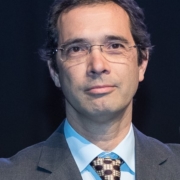
Vitor Correia is a geologist with more than 25 years of international working experience in Europe, Africa and South America. He holds a post-graduate degree in business-to-business marketing from the Kellogg Business School (US) and an MBA degree from the University of Lisbon. He has experience in managing businesses in the mining industry, covering the licensing, the exploration and the exploitation stages, with different mineral deposits, including copper, gold, iron and industrial minerals. He is the Secretary-General of the International Raw Materials Observatory, a non-profit, independent, international association that supports international cooperation in the mineral raw materials’ field, and he’s the Past President of the European Federation of Geologists. Vitor is an independent evaluator of mineral projects and a member of the Expert Group on Resource Classification of UNECE.
Privacy policy
1 Data procession notice
The organisers of this event (European Federation of Geologists (EFG) and the Horizon 2020 funded UNEXMIN project) are collecting the data you have provided for the registration to the UNEXMIN Final Conference on 26 September 2019 in Brussels, Belgium.
Your personal data are processed in accordance with the General Data Protection Regulation (EU) 2016/679.
The purpose of this data collection is to ensure a smooth organisation of the UNEXMIN Final Conference on 26 September 2019 and provide participants access to the venue.
The following personal data are collected: email address, first name, last name, professional affiliation and dietary requirements. We are asking for your dietary requirements to do our best to adapt the catering during the event accordingly.
The recipients of your data will be the EFG and UNEXMIN staff in charge of the event organisation. The participants list will be distributed during the event to all the participants including names and professional affiliations. Your data will not be shared with third parties and will not be used for other purposes.
Your data will be kept for a maximum period of three months after the end of the event. Data will be automatically deleted at the end of this period.
You have the right to access your personal data and the right to correct any inaccurate or incomplete personal data. If you have any queries concerning the processing of your personal data, you may address them to the EFG Office at info.efg@eurogeologists.eu.
2 Notice of filming, photography and audio recording
Photography, audio and video recording may occur during the event for communication and promotional purposes. By attending this event, you consent to interview(s), photography, audio recording, video recording and its/their release, publication, exhibition, or reproduction to be used for communications and promotional purposes on websites, social media, newsletters and other publications by the event organisers. You release the organisers of the event, its staff, and each and all persons involved from any liability connected with the taking, recording, digitising, or publication and use of interviews, photographs, computer images, video and/or sound recordings.
If you do not notify the organisers that you do not want to be filmed, recorded or photographed, you waive all rights you may have to any claim for the use of your image for communication activities related to the event.
You have the right to choose to not be filmed or photographed during the event. Please notify us (info.efg@eurogeologists.eu) of your wish to not be featured on websites, social media, newsletters and other publications.
You have been fully informed of your consent, waiver of liability, and release before entering the event.
Photos
Presentations
Click the banners below to have access to the presentations:
Videos
Marco Komac – UNEXMIN: The story you are now all a part of
Daniel Cios – European policy context of raw materials
Marcin Sadowski – Raw materials in Horizon 2020 (and beyond)
Helmut Mischo – The future of exploration in mining
Norbert Zajzon – Today’s exploration for future exploitation: UNEXMIN Underwater Explorer for Flooded Mines
Claudio Rossi – Robominers project
Stephen Henley and Hilco van Moerkerk – UNEXMIN Data post-processing
Gorázd Zibret – UNEXMIN Field trials and geological evaluation of the technology
Richard Shaw – Archeological discoveries at Deep Ecton Mine
Giorgia Stasi – UNEXMIN Inventory of Flooded Mines

